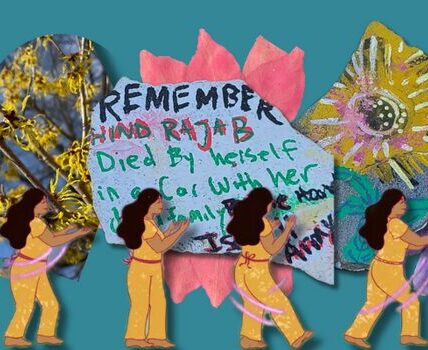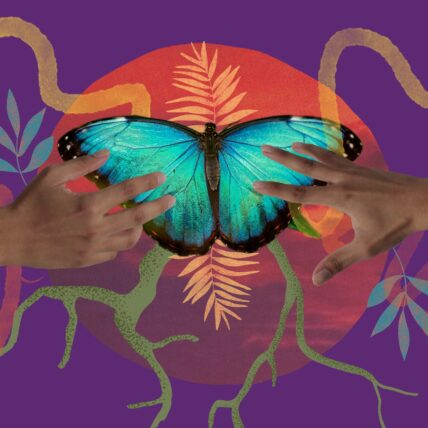We are encouraging our community to engage with this blog piece in a new way: Go on a walk, sit on the couch, stretch, or take some deep breaths while you listen to the work, narrated by Elissa Sloan Perry! Hit play on the audio below.
If you’d like to return to the text of the piece, you’ll find it after this animated text rendition of the poem that opens the blog, “Son, You Are.”
Son, you are.
Ancestors dream.
Uncle Sonny smiling
and weeping as you
Glide.
Uncle Sonny
Gone on. Made
A Wish
On turnip greens and fairy dust
And here you be.
A new soul
So freshly birthed
You are ancient.
So fierce in your
Delicate, no one
Dare touch you without deference.
Without care.
Your curve melts steel
Rearranges will
Your gentle bends time.
I wrote that poem two years ago after watching a video of Lil Buck dancing. Then I awoke with O’Shea Sibley, another Black man dancing, on my heart this morning. The poem was there on my heart too. Right ventricle and left. But there was no deference that evening for O’Shea. The steel did not melt. A tool for preparing food in my grandparents’ kitchen, for tending the turnip greens in the yard, was used instead by a 17-year-old to cut O’Shea Sibley down as he was joyously being himself in a world that wanted him to be something else.
Let me be clear: I am not suicidal, or homicidal for that matter. I have been violently upset.
I righted myself this morning—breathing, grounding, centering—just enough to be enough for today. I opened my email to messages hyping the power of this tool and that one and immediately, the most recent frustrating conversation about tools was on my brain and in taut tension with my heart. “I just want the tools,” a potential partner said to me. “Give me the assessment, the steps, the worksheet, the decision-making guide, the accountability script…the whole set. I want to be anti-racist, I want us to center the lives of Black and Indigenous TGNC people. Why do we keep fucking up?” Or from another recent asker seeking tools, “We want to fund concrete solutions that our trustees understand.”
There is nothing like the right tool for the right job, I tell them. And I believe it. A good tool in the hands of someone who knows how to use it can be a seemingly miraculous thing of the most exquisite beauty. I imagine tools like Building Blocks for Change, the recent racial equity assessment from Building Movement Project, or Transforming Organizations by Operationalizing Racial Justice, the updated guide from Maggie Potapchuk Associates, opening pathways and conversations and possibilities where there had been stuckness before and exhale a satisfied sigh.
“You cannot buy the revolution. You cannot make the revolution. You can only be the revolution. It is in your spirit, or it is nowhere.”— Ursula K. Le Guin
And a lot of times the tool is the wrong tool at the wrong time. Or we don’t have what we need to use it. Are you strong enough to use a jackhammer without hurting yourself or something else? Do you have the flexibility and dexterity to scale a tree with a leather strap? You don’t use the knife to massage the greens. Is your pinky strong enough to use that manual typewriter? Do you have the presence to use that other one over there? Do you even have the discernment and awareness to know if it’s the right tool? Like the golden lasso, many tools only work in certain hands. And even when the tool, the job, and the hands are all a fit, how are we tending to the being of young Black boys and those around them so they don’t decide to use a tool for slicing mangoes to take another’s life? Black boys hyper-sexualized by the media—social, corporate, and otherwise—desensitized to themselves and each other. Distanced at every turn from source, from their emotions, and bodies. Mired in half or distorted stories. How are we tending to their being? We have failed O’Shea Sibley and his murderer.
The many recent articles about dismantling white supremacy, building resilient organizations, forging a new way, etc. are all asking us to be something different individually and collectively. How are we making the space and mustering the courage individually and collectively to understand what the being means for us? What is your commitment to doing the learning and unlearning to be the revolution? What is the being you are bringing to the strategic framework, the racial equity implementation, the shared leadership structure, the…? Is it the being that is needed? How are you tending to it? What is your knife and how are you using it?






multiple ways of knowing for the win!! see you. thank you. 🙏
Thank you, Jodie. <3